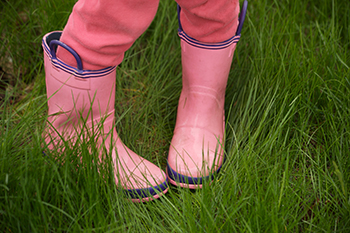
Most people's feet typically point straight ahead or outward, but some children develop a condition known as in-toeing, where the feet point inward which is often referred to as pigeon toes. In-toeing is a common phenomenon in young children, and while it often corrects itself with time, some cases require attention and treatment, based on the underlying cause. Internal tibial torsion is one cause of in-toeing, and most doctors refrain from prescribing treatment for young children with this condition. Braces and special shoes are generally ineffective and rarely used due to their expense and children's reluctance to wear them. Surgical correction is only considered in cases where the twist in the tibia is severe and appearance becomes a concern. Excess femoral anteversion, another cause of in-toeing, typically improves on its own as children age. Braces or shoe modifications are generally not effective, and surgery is only considered in very severe cases where the inward twist of the thigh bone is significant. Metatarsus adductus, characterized by a curved foot shape, may involve stretching exercises or the use of casts or braces for more severe cases. Fortunately, any residual curvature post-treatment does not impede a child's ability to run and play, and it is not painful. If your child’s in-toeing seems to be problematic, it is suggested that you schedule an appointment with a podiatrist who can determine what the best treatment is.
The health of a child’s feet is vital to their overall well-being. If you have any questions regarding foot health, contact Dr. Richard DiMario of Maine. Our doctor can provide the care you need to keep you pain-free and on your feet.
Tips for Keeping Children's Feet Healthy
If you have any questions, please feel free to contact our office located in York, ME . We offer the newest diagnostic and treatment technologies for all your foot care needs.